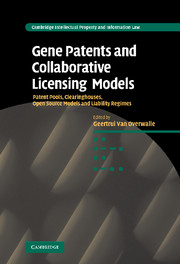 Gene Patents and Collaborative Licensing Models
Gene Patents and Collaborative Licensing Models from Part V - Different perspectives
Published online by Cambridge University Press: 14 January 2010
Introduction
Innovation in the life sciences depends on how much information is produced as well as how widely and easily it is shared. As shown by the contributions in this volume, policies governing the science commons – or alternative, more restricted information spaces – determine how widely and quickly information and research tools are distributed. The purpose of this chapter is to highlight why the science commons matters, and to analyse its organization. The concern for the governance of the science commons has caught the attention of a wide range of scholars in the mid 1990s, especially in legal scholarship. The interest of these scholars is in the cooperative use of scientific data, information, materials and research tools that actually are not in the public domain, and whose licensed use is legally protected by an intellectual property (IP) regime. In its more general meaning however, the “commons” designates any resource shared by a group of people that is subject to problems of underprovision or overconsumption of the shared resource, independently of its legal nature. From this general perspective, the scientific research commons, which we will call hereafter shortly the science commons, designates the scientific data, information and materials which are shared under conditions of non-exclusive use (though perhaps limited in its extent or use, depending on the collective agreements) within limited or global research communities.
To save this book to your Kindle, first ensure [email protected] is added to your Approved Personal Document E-mail List under your Personal Document Settings on the Manage Your Content and Devices page of your Amazon account. Then enter the ‘name’ part of your Kindle email address below. Find out more about saving to your Kindle.
Note you can select to save to either the @free.kindle.com or @kindle.com variations. ‘@free.kindle.com’ emails are free but can only be saved to your device when it is connected to wi-fi. ‘@kindle.com’ emails can be delivered even when you are not connected to wi-fi, but note that service fees apply.
Find out more about the Kindle Personal Document Service.
To save content items to your account, please confirm that you agree to abide by our usage policies. If this is the first time you use this feature, you will be asked to authorise Cambridge Core to connect with your account. Find out more about saving content to Dropbox.
To save content items to your account, please confirm that you agree to abide by our usage policies. If this is the first time you use this feature, you will be asked to authorise Cambridge Core to connect with your account. Find out more about saving content to Google Drive.